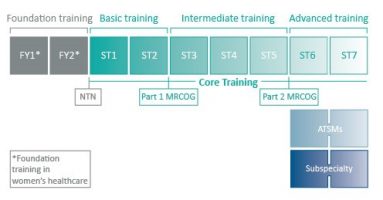The O&G training programme is a 7-year programme, starting at ST1. During the training, the trainee’s work will be monitored for satisfactory progress and subject to annual reviews in the form of annual ARCP (Annual Review of Competency Progression). Progression through the programme will be dependent upon satisfactory reviews.
The posts on this rotation have been approved for Specialist Training by the Postgraduate Dean, GMC and Royal College of Obstetricians and Gynaecologists. The posts attract National Training Numbers and provide training towards a Certificate of Completion of Training (CCT) when commenced at ST1. In recent years’ the school has been offering a small number of places at ST3 entry. National training places are offered through a competitive interview process held nationally.
The programme is based at five different Trusts and they are:
- John Radcliffe Hospital, Oxford University Hospitals NHS Foundation Trust (tertiary referral centre and Oxford University base hospital)
- Royal Berkshire NHS Foundation Trust, Reading
- Stoke Mandeville Hospital, Aylesbury, Buckinghamshire Healthcare NHS Trust
- Milton Keynes University Hospital NHS Foundation Trust, Milton Keynes
- Wexham Park Hospital, Frimley Health NHS Foundation Trust, Slough
A trainee can expect to rotate to any or all of the hospitals in the region during their training programme.
Allocation of placements are made by the Head of School and done shortly after the ARCP reviews.
Welcome Letter from Ms Ruth Houlden – Head of School
Board overview of the programme

Years 1 and 2 (ST1 and ST2): Basic Training
A trainee will spend these first two years gaining basic knowledge and competencies in obstetrics and gynaecology. They will be assigned an educational supervisor at the start of the year whom they will meet with regularly.
The trainee will commence their ePortfolio in the first year. The RCOG ePortfolio is a live electronic folder that all trainees are required to have throughout their training years. It is used to review their training and track their progress through the curriculum.
We have a robust teaching programme to deliver the RCOG curriculum. At ST1-2 trainees are given a full day of teaching that is planned regionally and occurs monthly.
A minimum of two years is spent at this level and progress onto ST3 is made following passing of the MRCOG part 1 exams and satisfactory annual ARCP reviews.
In recognition of the challenges of moving to the middle grade tier, we try and ensure that trainees stay in the same hospital for their ST2 and ST3 placements.
Years 3 to 5 (ST3-5): Intermediate Training
A trainee will complete the RCOG core curriculum to intermediate level during these 3 years. They will work and train on the middle grade rota and have supervision (direct/indirect).
The trainee will complete part 2 and 3 of the MRCOG exams and gain basic ultrasound competency in obstetrics and gynaecology.
During this time trainees have weekly Friday afternoon teaching that is organised regionally. This is mandatory, can be remote, and is pitched to the level of the MRCOG part 2/3.
Years 6-7 (ST6-7): Advance training
A trainee will complete the core curriculum and a minimum of two ATSM of their choice. There are competitive interviews at the end of ST5 for ATSM selection. Once the trainee has completed their core curriculum, a minimum of two ATSM, and met all the requirements for a satisfactory ARCP with an outcome 6, the trainee then goes on to make an application for CCT.
Academic clinical fellows
These are appointed jointly between the Deanery and University by separate advertisement. We currently have three ACFs and four academic clinical lecturers.
Research
The Nuffield Department of Obstetrics and Gynaecology (NDOG) supervises the ACFs and ACLs. There is access to research projects for other trainees which may lead to an MD or DPhil.
Less than full time training (LTFT)
As a school we are very proud to support LTFT training and over the years have seen at least 30% of our trainees take up LTFT training. Upon discussion with the Head of School, job sharing positions will also be considered. Please see the main webpage for more information on LTFT working.
Leave
Annual leave must be arranged at least six weeks in advance and individual units will have their own guidance. At most units, there will be a maximum number of trainees who can be away at once. Study leave is determined by each local unit under the guidance of the Trust’s Director of Medical Education and NHSETV guidelines. The fixed local teaching sessions will count within the study leave allocation. Personal study will usually only be given before examinations or completing research work.
OXSFOG (Oxford Scientific Forum for Obstetrics and Gynaecology
OXSFOG is an annual regional study day which all trainees and Consultants attend where trainees present their audits and scientific research. The meeting is organised by the five base hospitals on a rotating basis. This is a much loved and greatly anticipated event that allows trainees and trainers to showcase their work and to network.